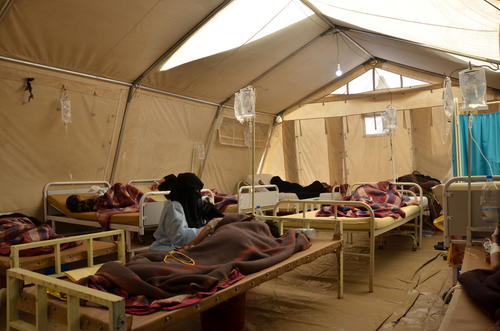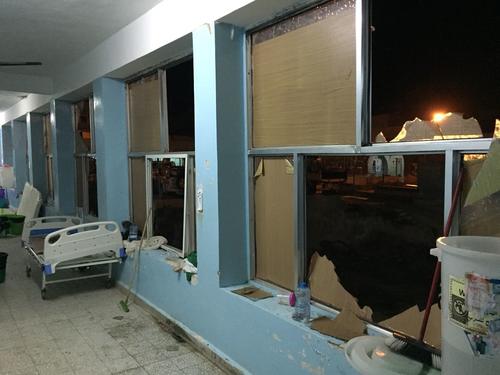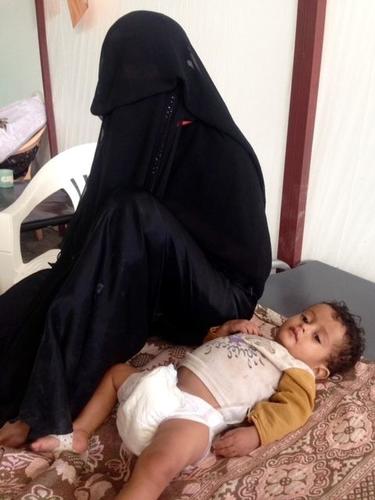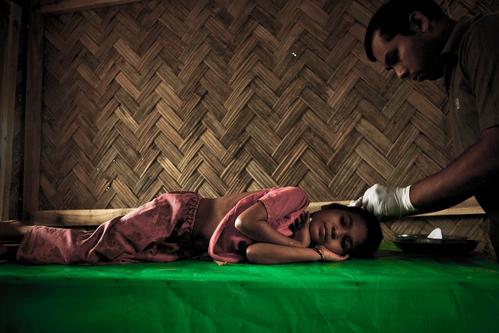Cases of cholera may have declined in Yemen, but the ongoing war and blockade are creating a new threat to public health as a suspected diphtheria outbreak takes hold.
By 4 December, 318 suspected cases of diphtheria and 28 deaths had been reported in 15 of Yemen’s 20 governorates. Half the suspected cases are children between the ages of five and 14, and nearly 95 per cent of deaths are children under 15. Nearly 70 per cent of all suspected cases are in Ibb governorate.
Diphtheria is a contagious and potentially fatal bacterial infection, mainly characterised by a thick grey membrane at the back of the throat or nose, sore throat and fever. It can be prevented through vaccination.
Marc Poncin, MSF’s emergency coordinator in Ibb, said:
“Globally, diphtheria has been eradicated from most countries after systematic childhood vaccination campaigns, and it’s become something of a neglected and forgotten disease. Even in Yemen, the last diphtheria case was recorded in 1992, and the last outbreak in 1982. The ongoing war and blockade are sending Yemen’s health system decades back in time.”
Poncin adds:
“After two and a half years of violence and a blockade on supplies including medicines and vaccines, the healthcare infrastructure is in tatters. The blockade on fuel has meant that patients cannot afford to travel to the very few health centres still operating across the country. This is crucial, because if people infected are unable to access treatment regularly, diphtheria can spread in the body and be fatal in up to 40 per cent of the cases.”
Humanitarian actors are also struggling to start diphtheria treatment and prevention activities due to the ongoing logistical difficulties in bringing specialised staff and needed supplies into Yemen and to areas where they’re most needed.
“This is undeniably another human-made disease inflicted on a country that has barely recovered from a massive cholera outbreak, which is not even over yet,” says Poncin.
“Globally, the decline of diphtheria in recent years was accompanied by a concrete loss of knowledge regarding its treatment. This is making it much more difficult for health workers to quickly and correctly identify, isolate and treat cases.
“To treat diphtheria, patients need to be isolated and receive antibiotics and antitoxins. But the global supply of the antitoxin, which is the single most important aspect of treatment, is very limited, and no antitoxins were available in Yemen until a few weeks ago.”
To tackle the outbreak, MSF, together with WHO, is acquiring most of the antitoxin that is still available worldwide, and ordering more antibiotics. MSF has also put together a rapid response team to survey and identify suspected cases in communities, and provide prophylaxis to those in contact with a diphtheria patient.
On 11 December, MSF opened a diphtheria treatment unit in Nasser Hospital in Ibb city, and is in the process of supporting two others in Yarim and Jiblah hospitals – the latter with intensive care unit capacities. An ambulance referral system will also be set up to transport suspected cases to hospital. In addition, MSF will support the transport of samples to a laboratory to better confirm cases, and carry out health promotion activities to alert communities to diphtheria. Meanwhile, MSF is also setting up an intensive care unit in Sadaqa hospital, Aden, where 14 cases were recorded, resulting in four deaths.
“We have been visiting houses where six or more displaced people are living in very cramped conditions. In such settings there are no ways to properly isolate cases, and it creates the perfect conditions for diphtheria to spread. Isolating and treating patients, offering preventive care for affected communities and raising public awareness are therefore crucial to halt the spread of diphtheria,” says Poncin. “Yemen’s healthcare system cannot afford another outbreak.”






